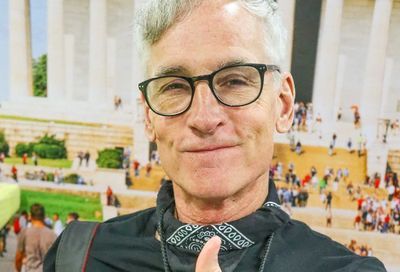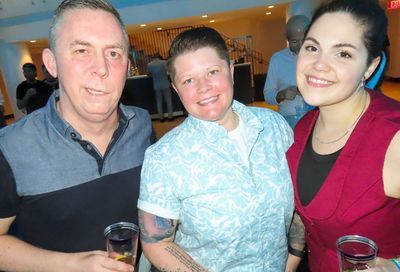Hate Rail
Local man says mugging escalated into anti-gay hate crime on Metro
By the time Nathaniel Salerno finally made it home to his apartment on Capitol Hill around 4 a.m. on Saturday, Dec. 8, his white shirt had turned red, soaked in his own blood.
”My roommate was up and he saw me walk through the door. He stood up, came over to me, and I just fell down to the ground and started bawling.”It was the second time that night that Salerno, 25, an online advertising coordinator for Congressional Quarterly, found himself lying on the floor. The first occurred during his trip home on the Metro, from a Friday night out with friends, which included dinner at Jack’s Restaurant & Bar and drinks at JR.’s, both on 17th Street in Northwest.After beginning his trip home from the Dupont Circle Metro station, Salerno transferred at Metro Center. He boarded an empty car headed toward his destination, the Eastern Market Station on Capitol Hill. Sitting in the middle of the car, across from facing seats, he settled in for a game of ”Brick Breaker” on his BlackBerry.
He wasn’t alone for long.
A group of seven young men appearing in age to be 16 to 20 made it onto the train seconds before the car’s recorded announcement, ”Doors closing.” And sometime between 1:40 and 2 a.m., as the train began to move, so did the young men.
”They approached me and surrounded me, standing up, and one of them told me to give them money,” Salerno says. ”I said, ‘No. Leave me alone.’ Then I could see it escalating so I stood up to give them my wallet…and that’s when the first punch came directly to my jaw line. Another punch came to my eye, and I hit the floor.”
While lying on the floor of the subway car, Salerno says the group of men kicked his head, legs and ribs, as they yelled ”faggot.”
”With every kick it was another ‘faggot,”’ he recalls. ”I feel as though it was originally meant to be a mugging, but because I’m not a super-macho masculine person, as soon as they realized I’m a homosexual, it kind of enraged them even more.”
The beating and homophobic slurs continued while the train rolled from the Federal Triangle Station to the Smithsonian stop, all of which was caught on Metro’s surveillance cameras, during a trip that usually lasts between two to four minutes, depending on the train’s speed.
Finally, the train stopped and the doors slid open again.
”They all ran,” Salerno says. ”They had my wallet and my BlackBerry. I got up and tried to run after them, but being injured — my left leg was really bruised up — I couldn’t really chase them.”
Instead, a blood-soaked Salerno caught the attention of the Smithsonian’s station manager, who immediately contacted the Metro Transit Police.
Before even speaking to police, Salerno used a payphone to cancel the credit cards in his wallet, which also contained about $20 in cash.
”I remember one of them really well,” Salerno recalls. ”He had to have been about 6’2”, between 16 and 20, African American, shaved head, wearing a black coat. He was the one who gave me the first punch. The others I don’t remember a whole lot about.”
Salerno says he refused medical care because he just wanted to get home, but insisted to Metro Transit Police that the incident had elements of a hate crime.
”I asked them to take me to my house. I get in the back of a squad car and [the officer] actually drives me to the Eastern Market Station, because that’s where I told him I was going. I said, ‘I actually live…five blocks away, and he was like, ‘Well this is about as far as I can take you.’ So I walked five blocks, bloody. I still felt vulnerable, walking home in a dark residential neighborhood I was upset about that.”
Salerno says he was also upset by Metro Transit Police’s apparent effort to initially downplay the incident as a mugging, not a hate crime. Salerno says that tack changed once his story broke on FOX News.
”The original police report that Metro [Transit Police] filed didn’t list it as a hate crime. After the media press coverage, as of 5 o’clock Monday, Dec. 10, they’ve now written a report [that] does have a ‘hate crime-based robbery’ attached to it. It changed, in my opinion, just because I got press attention.”
Sgt. Brett Parson, supervisor of the Metropolitan Police Department’s four different special liaison units, including the Gay and Lesbian Liaison Unit (GLLU), says that unit is working with Metro Transit Police and Salerno on the case.
”The law in the District of Columbia is clear,” says Parson. ”If there is evidence that the crime was motivated in part or in whole by the assailant’s hatred, bias or prejudice towards the victim’s acts or perceived status, then it should be classified as a hate/bias crime. The question is whether Metro Transit Police Department have the evidence to support that or not.”
That evidence was caught on Metro’s surveillance video, which Salerno says Metro Transit Police plan to use in hopes of catching the seven suspects.
They let Salerno view the tape on Tuesday, Dec. 11.
”They are circulating it to areas that they believe [the suspects] will be,” he says. ”If they don’t have any traction there, they told me they would release the video to the public.”
Victor Clayton, a detective with the Metro Transit Police, did not return calls seeking comment by Metro Weekly deadline.
While Metro Transit Police did not respond to Metro Weekly, Candace Smith, a media-relations professional with the Washington Metropolitan Area Transit Authority (Metro), responded to the Washington Post during an online chat on Monday, Dec. 10, with the following statement:
”Metro Transit Police responded to the scene immediately and spoke to the victim and took an official report. Officers said the victim never told them that the assailants had used anti-gay language during the assault….
”Officers indeed did volunteer to drive the man home, however he said he only wanted the officers to drop him off at the Eastern Market Metrorail station, which they did. Metro does have cameras in its stations, and Metro Transit Police have publicly released video of suspects when investigators believed it would help them catch criminals.”
Of the offer to be dropped off at home, and not initially reporting the incident as a hate crime, Salerno, who visited the GLLU on Monday to report the incident with that unit, says that is simply ”untrue.”
”I blatantly remember saying it to the officers there,” Salerno says, adding that on Tuesday, Dec. 11, he contacted Councilmember Jim Graham (D-Ward 1), who is gay and also a Metro Board member.
”We spoke for a very long time yesterday and he’s talking to the general manager of the Metro Board [who] agreed to install a GLBT sensitivity training for Metro employees.”
Graham, whose efforts have been described by Salerno as ”supportive,” is slated to discuss the topic at an upcoming Metro Board meeting on Dec. 13.
As the case unfolds, Salerno remains determined to be vocal on how the incident could have been prevented or better handled.
”I consider myself an introverted and shy person, but this story needs to be heard,” he says. ”Someone has to say something or stuff like this going to happen again.”
Support Metro Weekly’s Journalism
These are challenging times for news organizations. And yet it’s crucial we stay active and provide vital resources and information to both our local readers and the world. So won’t you please take a moment and consider supporting Metro Weekly with a membership? For as little as $5 a month, you can help ensure Metro Weekly magazine and MetroWeekly.com remain free, viable resources as we provide the best, most diverse, culturally-resonant LGBTQ coverage in both the D.C. region and around the world. Memberships come with exclusive perks and discounts, your own personal digital delivery of each week’s magazine (and an archive), access to our Member's Lounge when it launches this fall, and exclusive members-only items like Metro Weekly Membership Mugs and Tote Bags! Check out all our membership levels here and please join us today!



















